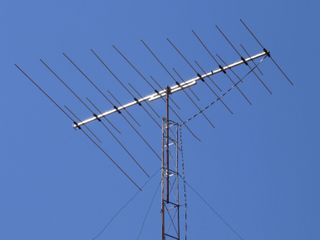BBC: No clear future for free-to-air TV platforms
Huggers says IPTV key to future of television

The BBC's Erik Huggers has admitted that the future for free-to-air digital platforms like Freesat and Freeview is 'unclear' – suggesting that only IPTV and the Project Canvas venture will give consumers the services and features that they need.
Huggers, speaking at the Intellect Consumer Electronics conference, said that, despite work on adding HD to Freeview and continued support to Freesat, Project Canvas was the only way in which free to air viewers could keep up with the level of Pay TV innovation.
"If you look at free-to-air platforms [such as Freeview and Freesat] there is not a clear future for them," said Huggers, to an audience that contained the managing directors of both platforms.
"Obviously the BBC and partners are working together on two of these platforms and we're upgrading Freeview to HD and adding loads of functionality and services, but innovation in Pay TV is much faster and we think it's important for subscribers to have an option which is subscription free and has the same sort of features and functionality."
Opportunity
"In other words, we think that by marrying linear television with broadband internet activity you can get there. It's a great opportunity," he added.
"We also think that BBC's heritage in research and development – 60 years of working with the industry to drive open international standards - puts us in a unique position to drive this."
Get daily insight, inspiration and deals in your inbox
Get the hottest deals available in your inbox plus news, reviews, opinion, analysis and more from the TechRadar team.
The BBC is hoping that Canvas – its attempt to unify the UK tech industry behind a unified set of standards (and, some would argue, a single platform) can provide a valid subscription free television service for the new era of internet connected viewing.
iPlayer showing the way
"Why is the BBC developing this?" Huggers asked. "I think the iPlayer has shown us with five million unique users a week and hundreds of millions of streamed shows – that consumers are super hungry for on-demand content.
"Today the majority of that content is not consumed in the living room but we have one or two exceptions.
"We do some work with Virgin Media…which has made the iPlayer available through a dedicated app on their network and what we've found is that 26 per cent of overall consumption of all iPlayer comes from the Virgin Media network.
"That's quite interesting, because the footprint of that industry compared to the footprint of the rest of the internet is obviously a different story."
Unified approach
The Canvas project is still being looked at by the BBC Trust – and reception from the industry has been mixed, but Huggers believes that the best way forward is for a unified approach.
"Obviously all of this is subject to BBC Trust approval," adds Huggers. "An application has been filed a while back and many of you have submitted [your opinions] and the Trust is in deliberation as to whether it wants the BBC empowered to do this now.
"If this is to become a mass market opportunity that consumers will embrace. If this is to become a world where there is healthy competition. If this is the world where there are tens of thousand of apps available in the living room then the only way to do that in my mind is to agree that the way forward is together and everyone get their shoulders behind and push it, versus everyone running with their own ambitions and fragmenting the market and delaying the roll out of IPTV services."
Patrick Goss is the ex-Editor in Chief of TechRadar. Patrick was a passionate and experienced journalist, and he has been lucky enough to work on some of the finest online properties on the planet, building audiences everywhere and establishing himself at the forefront of digital content. After a long stint as the boss at TechRadar, Patrick has now moved on to a role with Apple, where he is the Managing Editor for the App Store in the UK.

